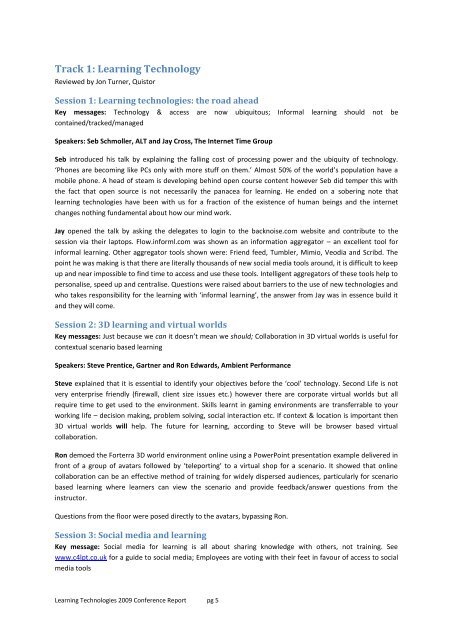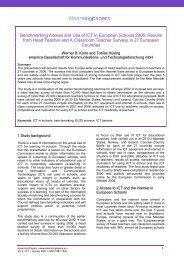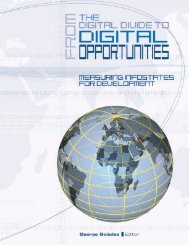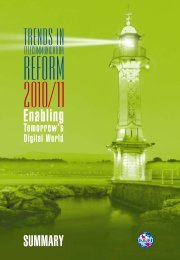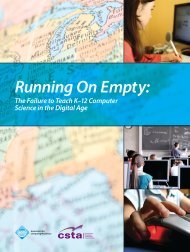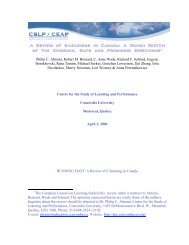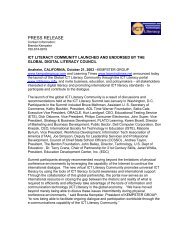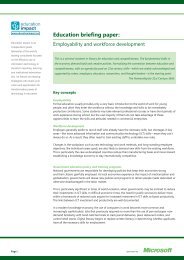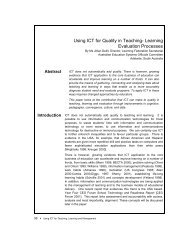Learning Technologies Conference 2009 - ICT Digital Literacy
Learning Technologies Conference 2009 - ICT Digital Literacy
Learning Technologies Conference 2009 - ICT Digital Literacy
You also want an ePaper? Increase the reach of your titles
YUMPU automatically turns print PDFs into web optimized ePapers that Google loves.
Track 1: <strong>Learning</strong> Technology<br />
Reviewed by Jon Turner, Quistor<br />
Session 1: <strong>Learning</strong> technologies: the road ahead<br />
Key messages: Technology & access are now ubiquitous; Informal learning should not be<br />
contained/tracked/managed<br />
Speakers: Seb Schmoller, ALT and Jay Cross, The Internet Time Group<br />
Seb introduced his talk by explaining the falling cost of processing power and the ubiquity of technology.<br />
‘Phones are becoming like PCs only with more stuff on them.’ Almost 50% of the world’s population have a<br />
mobile phone. A head of steam is developing behind open course content however Seb did temper this with<br />
the fact that open source is not necessarily the panacea for learning. He ended on a sobering note that<br />
learning technologies have been with us for a fraction of the existence of human beings and the internet<br />
changes nothing fundamental about how our mind work.<br />
Jay opened the talk by asking the delegates to login to the backnoise.com website and contribute to the<br />
session via their laptops. Flow.informl.com was shown as an information aggregator – an excellent tool for<br />
informal learning. Other aggregator tools shown were: Friend feed, Tumbler, Mimio, Veodia and Scribd. The<br />
point he was making is that there are literally thousands of new social media tools around, it is difficult to keep<br />
up and near impossible to find time to access and use these tools. Intelligent aggregators of these tools help to<br />
personalise, speed up and centralise. Questions were raised about barriers to the use of new technologies and<br />
who takes responsibility for the learning with ‘informal learning’, the answer from Jay was in essence build it<br />
and they will come.<br />
Session 2: 3D learning and virtual worlds<br />
Key messages: Just because we can it doesn’t mean we should; Collaboration in 3D virtual worlds is useful for<br />
contextual scenario based learning<br />
Speakers: Steve Prentice, Gartner and Ron Edwards, Ambient Performance<br />
Steve explained that it is essential to identify your objectives before the ‘cool’ technology. Second Life is not<br />
very enterprise friendly (firewall, client size issues etc.) however there are corporate virtual worlds but all<br />
require time to get used to the environment. Skills learnt in gaming environments are transferrable to your<br />
working life – decision making, problem solving, social interaction etc. If context & location is important then<br />
3D virtual worlds will help. The future for learning, according to Steve will be browser based virtual<br />
collaboration.<br />
Ron demoed the Forterra 3D world environment online using a PowerPoint presentation example delivered in<br />
front of a group of avatars followed by ‘teleporting’ to a virtual shop for a scenario. It showed that online<br />
collaboration can be an effective method of training for widely dispersed audiences, particularly for scenario<br />
based learning where learners can view the scenario and provide feedback/answer questions from the<br />
instructor.<br />
Questions from the floor were posed directly to the avatars, bypassing Ron.<br />
Session 3: Social media and learning<br />
Key message: Social media for learning is all about sharing knowledge with others, not training. See<br />
www.c4lpt.co.uk for a guide to social media; Employees are voting with their feet in favour of access to social<br />
media tools<br />
<strong>Learning</strong> <strong>Technologies</strong> <strong>2009</strong> <strong>Conference</strong> Report pg 5


